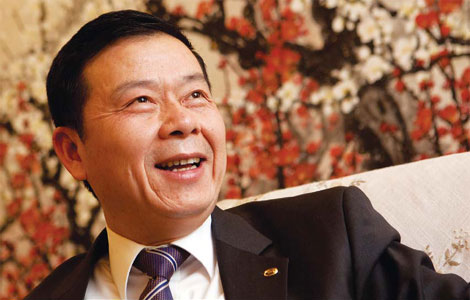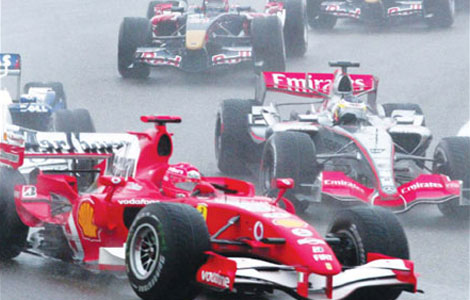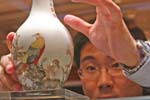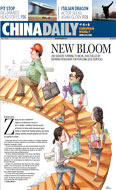Chinese auto industry a 'weak giant'
Updated: 2011-04-01 10:56
By Wang Chao (China Daily European Weekly)
 |
|
Zeng Qinghong, general manager of Guangzhou Automobile Industry Group Co, says China's auto industry is still weak. Provided to China Daily |
Sector filled with too many small players; stakes now being raised
Congestion happens not only on roads, but also apparently in China's auto industry.
Zeng Qinghong, general manager of Guangzhou Automobile Industry Group Co, says despite the numerous media reports that more than 18 million cars have been sold in China last year, the auto industry is still "a weak giant".
"There are too many small car companies with too little production capacity," Zeng says.
Guangzhou Automobile Industry Group Co (GAGC) is one of the top five auto groups in China and is based in South China's Guangdong province. Last year, the company sold about 700,000 cars, mostly joint-venture brands with Toyota and Honda.
Zeng has been working in Guangzhou for 30 years, since he was 18 in 1979. First as a motor mechanic, then a technician, later an engineer, and finally a manager, Zeng witnessed how a local factory grew into one of the biggest national auto groups in the country.
Last year, Zeng witnessed another revolution in the Chinese market. While auto giants such as General Motors were struggling and while Toyota was busy handling its recall, many Chinese auto companies experienced a bull market, as indicated by total sales figures.
But with a growing industry, the stakes have been raised for Chinese automakers and higher profits are now expected.
Competition within China, Zeng says, is now reaching fever pitch.
Figures from China Automotive Technology & Research Center show that by 2015, 20 major auto groups and 10 original equipment manufacturers (OEMs) will reach a total production capacity of 31.24 million, which will be almost half of global sales.
Zeng and other industry insiders say that with increased production comes many issues, including over-duplication of projects, outdated production facilities and blind expansion.
The industry veteran says change must be made immediately.
"In the near future, big companies will eat up smaller ones, and the existing big companies will consolidate through mergers and acquisitions," he says.
Zeng predicts that eventually the number of auto companies will be reduced to 10, and five auto centers will be formed across the country.
"The five auto centers will be located in the North, South, East, West and Central China. I hope GAGC will be the one in the South," Zeng says.
He says that in order for companies to survive, they will have to have an annual production capacity of at least 2 million cars.
In September of last year, the central government issued a policy that encourages conglomeration, lending support for M&As among Chinese auto companies.
GAGC acted quickly. Three months ago, GAGC acquired Gonow, a private auto company, and laid out bases in Hangzhou, Taizhou (both in East China's Zhejiang province) and Dongying (in East China's Shandong province). Recently, the government approved the reorganization of GAGC-Mitsubishi assets.
But Zeng warns that automakers should not expand blindly.
"For GAGC, markets in Hunan, Guangdong, Zhejiang and other southern provinces will be our major targets," Zeng says. "Any potential M&A has to be done under this blueprint."
But in addition to encouraging integration among auto companies, government policies have made the urban auto market more difficult for automakers.
Local governments such as in Beijing have issued strict auto purchase restrictions to relieve severe congestion problems in major cities. Customers now need to pay more, monetarily or in terms of energy costs, to own a car.
But mergers have not been exactly smooth for automakers. Zeng says that he found flaws in laws and regulations governing M&As.
"Sometimes a deal might get approved by the National Development and Reform Commission, but rejected by the China Securities Regulatory Commission," he says. "This is one of the big problems in closing out deals."
A member of the Chinese People's Political Consultative Conference, China's top political advisory body, Zeng raised this issue during the recent two sessions.
"In M&As, it is good for the government to point the direction, but the deals should be done by the companies," Zeng says. "Detailed instructions from the government can only make a company die sooner."
For a bigger share of the increasingly competitive market, GAGC, like other major manufacturers in China, have begun to tap into second- and third-tier cities as well as the rural market.
"Although products sold in this market are mainly mid- to low-end, we cannot ignore the great potential," Zeng says. "Besides, with the growth of disposable income and improvement of logistics, we believe the sales of high-end cars will catch up soon in rural areas."
The GAGC-Gonow, priced at 50,000 yuan (5,389 euros), is expected to become a major brand in second- and third-tier cities.
To be more competitive, Zeng says GAGC is cutting on labor costs.
"We will raise the level of automation to gain more production capacity, and gradually phase out manual labor," he says.
E-paper

Green light
F1 sponsors expect lucrative returns from Shanghai pit stop
Buying into the romance
Born to fly
Light of hope
Specials

Share your China stories!
Foreign readers are invited to share your China stories.

No more Mr. Bad Guy
Italian actor plans to smash ‘foreign devil’ myth and become the first white kungfu star made in China.

Art auctions
China accounted for 33% of global fine art sales.
